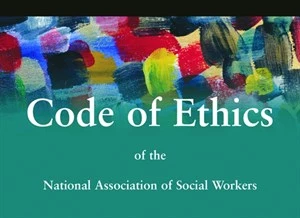 For your Presidents Day review, section 6.04 of the NASW's Code of Ethics, "Social and Political Action."
For your Presidents Day review, section 6.04 of the NASW's Code of Ethics, "Social and Political Action."
(a) Social workers should engage in social and political action that seeks to ensure that all people have equal access to the resources, employment, services, and opportunities they require to meet their basic human needs and to develop fully. Social workers should be aware of the impact of the political arena on practice and should advocate for changes in policy and legislation to improve social conditions in order to meet basic human needs and promote social justice.
(b) Social workers should act to expand choice and opportunity for all people, with special regard for vulnerable, disadvantaged, oppressed, and exploited people and groups.
(c) Social workers should promote conditions that encourage respect for cultural and social diversity within the United States and globally. Social workers should promote policies and practices that demonstrate respect for difference, support the expansion of cultural knowledge and resources, advocate for programs and institutions that demonstrate cultural competence, and promote policies that safeguard the rights of and confirm equity and social justice for all people.
(d) Social workers should act to prevent and eliminate domination of, exploitation of, and discrimination against any person, group, or class on the basis of race, ethnicity, national origin, color, sex, sexual orientation, gender identity or expression, age, marital status, political belief, religion, immigration status, or mental or physical disability.
What It Means in Practice
Section 6.04 of the NASW Code of Ethics isn’t just about activism—it’s about making sure systems don’t work against your clients.
Social and political action includes:
-
Calling out policies that disproportionately harm certain groups
-
Advocating for access: to food, housing, health care, education
-
Engaging in community organizing, protests, or policy reform efforts
-
Educating decision-makers on social justice implications
-
Working within your agency to ensure procedures promote equity
You don’t need to be a full-time organizer to fulfill this standard—even small actions count. What matters is recognizing when systems, not just individuals, create harm.
What the ASWB Exam Might Ask
Expect questions that frame macro-level problems in a micro-level scenario. For example:
-
A client is denied services due to immigration status—how should you respond?
-
A supervisor discourages political advocacy—what are your obligations?
-
You notice agency policies that disproportionately penalize low-income clients—what next?
Look for answers that reflect:
-
Upholding client dignity
-
Engaging in appropriate and ethical advocacy
-
Working through channels of accountability, both within and beyond your agency
Practice Question
A social worker at a public health clinic observes that recent policy changes have made it more difficult for undocumented clients to access care. According to the NASW Code of Ethics, what is the MOST appropriate action?
A. Ignore the change unless a client explicitly complains
B. Alert the media to expose the injustice
C. Advocate within the agency and with policymakers to improve access
D. Refer undocumented clients to other agencies without discussing the policy
This reflects the ethical obligation to engage in social and political action to ensure access and equity, in line with Standard 6.04. Correct answer: C. Advocate within the agency and with policymakers to improve access.
Final Takeaway
Social workers aren’t just helpers—we’re changemakers. Whether it’s writing a letter to a city council or speaking up in a staff meeting, advocacy is baked into the Code. And on the exam, the right answer often includes standing up for fairness—even when it's not comfortable.

 For your Presidents Day review, section 6.04 of the NASW's
For your Presidents Day review, section 6.04 of the NASW's